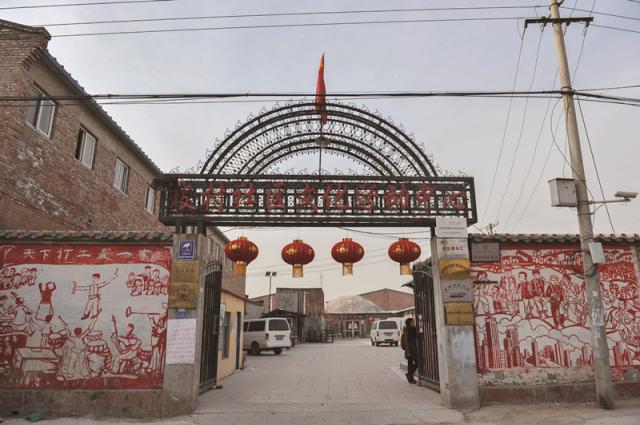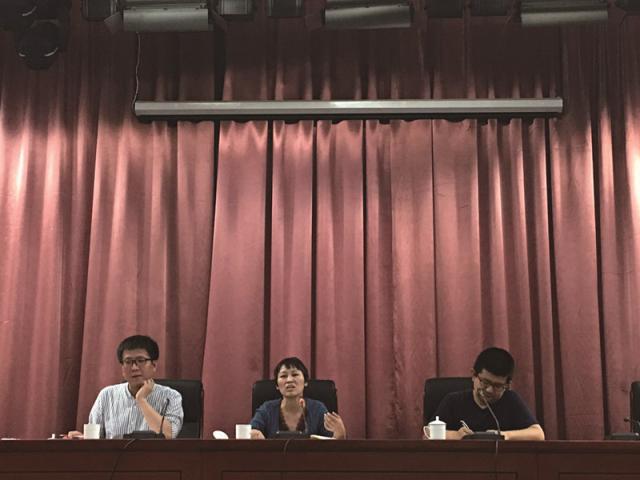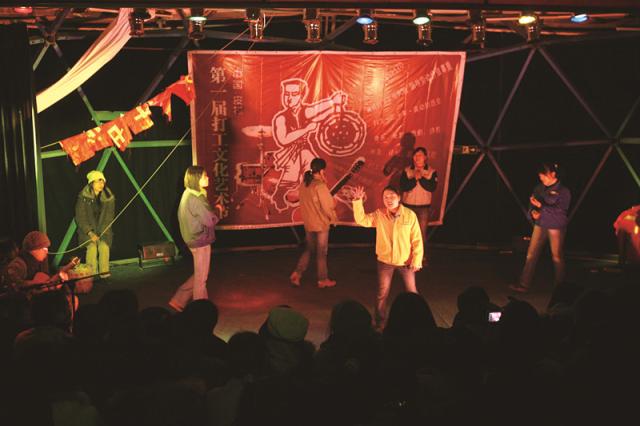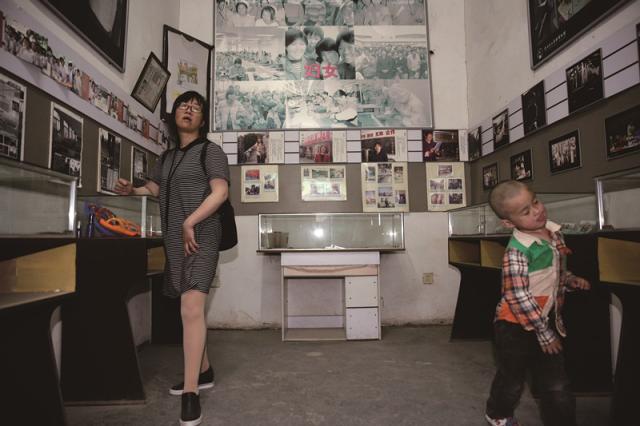
 Old Version
Old Version
Fan Yusu

Fan Yusu takes care of a baby in an employer’s home

The Picun Community Cultural Activity Center, where Workers’ Home is based, nourishes the diverse culture of migrant workers in Picun

Fan Yusu (center) attends a seminar titled “Fan Yusu, Neo-working class Literature and Cultural Rights” held by the Chinese National Academy of Arts on May 5
The sandstorm that swept Beijing for days in early May was gone at last, but that evening Picun Village was struck by an unexpected power outage. Fan Yusu walked past the villagers in the darkness, and sat down on a stone step by the roadside. The silence of the night was repeatedly torn up by the thunder of low-flying airplanes. “My ears have long since gotten used to such a roar. I don’t find it noisy any more,” Fan told NewsChina.
The 44-year-old nanny used the term “sandstorm” to describe her recent and sudden fame. On April 24, NoonStory, a public WeChat account that publishes original works by professional and amateur writers, posted Fan’s 7,000-word autobiographical essay, titled “I Am Fan Yusu.” The essay chronicles the Oliver Twist-like struggles of a rural woman trying to build a life in the big city over three decades. It also touches upon thorny issues such as the widening gap between rich and poor, the urban-rural divide, discrimination towards migrant workers and the government’s violent seizure of farmland.
Once published, the article immediately went viral on social media. It received more than 20,000 comments and was shared more than 100,000 times in the first 24 hours. Literally overnight, Fan was catapulted to literary stardom.
A nanny, single mother of two daughters and literature fanatic, Fan uses a simple, sincere and humorous tone to pen down the challenges of being a member of China’s exploited underclass. But she never believed her fate would be totally changed by an essay. For her, literature was just a beam of light that shone during the short breaks between work.
“My life is a book that’s unbearable to read, and fate has bound that book in an utterly clumsy way,” reads the beginning of Fan’s essay.
Fan was born in a deprived village near Xiangyang in central China’s Hubei Province. She was the youngest of five.
Fan learnt to read novels on her own at the age of six. She read Charles Dickens’ Oliver Twist and Great Expectations, as well as works by Daniel Defoe, Maxim Gorky, Charlotte Bronte and Gabriel Garcia Marquez. “If a person cannot feel happiness and satisfaction in life, it must be because they aren’t reading enough novels,” believed Fan even as a little girl.
Inspired by books, Fan left home at the age of 12 without saying goodbye, heading south to Hainan island, China’s southernmost province, to see the big world. She ate papaya and coconut in the shade and looked for food in the trash cans – “all the heroes in the books lived this way.”
When she returned home after her three-month sojourn, all she received was hatred from her father and brothers. In the village, if a girl abandons her family and then returns, she has “damaged her own virtue” and shamed her whole family.
Due to this “deviant” behavior, Fan was unable to continue in education. She started work as a teacher in a remote village that same year.
She described the days in the countryside being as dull as “viewing the sky from the bottom of a well.” At the age of 20, she left home once again, heading north to Beijing.
In Beijing, she changed jobs several times and married a man from northeastern China, with whom she had two daughters. However, the man later turned out to be alcoholic and violent.
“I couldn’t bear his domestic violence any more, so I decided to take my kids back to my hometown. That man never looked for us. Later I heard he went from Manzhouli to Russia, and right now he’s probably stumbling drunk down a Moscow street,” Fan wrote.
After returning to Xiangyang, Fan and her daughters were not welcomed by her eldest brother, who avoided her “like the plague” and argued that “a married daughter is like poured water, no longer a member of her parents’ family.” Only her mother fully accepted her, but still did not have the power to offer help.
Fan came back to Beijing with her daughters, shifted between several odd jobs and dwellings and finally settled in Picun Village on the eastern edge of the city.
“Friends agree best at a distance,” is the phrase Fan used to describe her relationship with her family. She told NewsChina that she felt herself to be like the “duckweed of the floating world.”
‘Carrot’ not ‘Ginseng’
“I am a person of very low self-esteem,” Fan said. She mentioned the word “self-inferiority” twice during the interview.
“I used to be very arrogant,” she wrote in her essay. Her extensive reading nourished her dream and pushed her to escape from the village to big cities. Yet the cruel lessons she learnt from reality from time to time made her affirm her position in society.
“A carrot is always a carrot. It will never become a ginseng root. I’m clearly aware of it,” Fan told NewsChina.
Fan described herself as “a woman struggling to survive on the lowest rung of society.” Under constant pressure and discrimination whether for being a single mother or low class, she found an invisible web had trapped her life. She admitted that living in this society, women “have to face more pressures.”
Picun is an urban village where hundreds of thousands of migrant workers live alongside an “ant tribe” – young college graduates who live in converted basements and illegally partitioned rooms in the outskirts, hardworking and intelligent, yet anonymous and underpaid.
After moving there, Fan worked first as a kindergarten teacher at a school for children of migrant workers. When her younger daughter could go to school on her own, Fan quit the kindergarten job and became a nanny.
Working for various kinds of families made her aware of the huge discrepancies in the different social classes. If the rich and poor have something in common, she observes, it is that they all live in anxiety to some degree.
One of her rich employers is concerned about whether or not to emigrate due to the air pollution problem; an employer who owns a dozen properties is anxious about devaluation or missing the best times to make a deal; a millionaire’s mistress who feels she has to put on exquisite makeup every day, waiting for her lover to come. People in Picun have different worries, complaining about wage arrears, children’s education or the difficulty of finding a wife.
Fan told NewsChina that some of her employers would hire college students from prestigious universities as tutors for their children.“These students come from the best universities in China, but they have to work as private tutors to make a living. These students, who will join the ant tribes in future, also look down on the nannies,” Fan told our reporter.
When her elder daughter could read novels, Fan went to flea markets and waste collection stations to buy secondhand books by the pound. She hoped that through self-education her daughters could avoid the fate of “being a screw in the world’s factory or puppet-like Terracotta warriors on an assembly line.”
Her elder daughter started working as a laborer at the age of 14, and learnt many crafts while working hard. Now 20, the elder daughter has become a white-collar worker with a good annual salary of 90,000 yuan (US$13,000).
In Picun, an organization called Worker’s Home serves as a cultural center for migrant workers there, providing them with facilities such as a theater, cinema, library and a museum.
In her spare time, Fan would visit the library of the Worker’s Home to borrow books or head to the National Library and Capital Library to read local records archives and chronicles. As her reading records at the Worker’s Home library show, Fan reads widely. Besides books on kindergarten teaching and child psychology, it is fiction such as works by George Orwell that Fan reads the most.
“Although novels like 1984 and Animal Farm are fictional and allegorical on the surface, they nonetheless reflect the truth of a long period of human society,” Fan told NewsChina.
In late 2014, the Worker’s Home set up a literature group. Zhang Huiyu, a literary scholar of the Chinese National Academy of Arts, volunteered to teach literature and writing courses to workers in Picun. Zhang encouraged his students to write about their lives and later compiled their works into a volume called Picun Literature.
Fan Yusu attended the course for a year, during which she wrote her first essay “One Day of My Life,” a diary-like record of working as a kindergarten teacher, marking the start of her writing.
Fan has tales to tell. Her strong desire to express herself cannot be satisfied merely by recording events. Making use of the snatched moments of rest, Fan has written a 100,000-word novel, for which she has already thought of a title: To Meet Again.
As Fan explained, the novel is based on fact, on the previous and current lives of people she has known. “The source of art is in life, and real life is absurd,” she wrote.

Workers’ Home holds the First Migrant Worker Arts Festival in Picun Village in 2009, in which migrant workers perform original plays in the newly-constructed New Workers Theater

Media constantly compares Fan Yusu with the famous poet Yu Xiuhua, who is also a woman from rural Hubei Province. On May 3, Yu Xiuhua visited the Workers’ Home, hoping to see Fan Yusu. However, Fan did not appear
Never would Fan imagine that her quiet life would be struck by a storm after her essay “I Am Fan Yusu” was published on NoonStory. Things got out of control in a way that far exceeded her expectations.
Journalists from all around the country flocked to her eight-square-meter home and to the office of the literature group. A website announced its intention of providing Fan a position as editor for its parenting channel; a media outlet said it could help Fan “find a boyfriend.” Journalists also rushed to Fan’s hometown, attempting to interview her 83-year-old mother.
Overwhelmed by the sudden fame, Fan had to abandon her home and vanish from public view. Through a message she sent to a reporter, Fan claimed that her “social phobia had turned into depression” and she had hidden herself “in an ancient temple in a nearby mountain.”
“It’s like a sudden sandstorm, so gray and hazy that it might easily veil one’s eyes,” Fan told a WeChat official account, Meirirenwu.
A new media platform invited her to become a contracted writer, promising to pay 10,000 yuan (US$1,450) per month for four monthly articles. She rejected the offer outright, as she feels she cannot write on demand about topics given to her by others.
As Fan explained, writing “I Am Fan Yusu” was driven by a strong sense of pain and shame. The essay was originally written for her mother, after she heard that her mother had been violently mistreated.
A strong woman, her mother, as she described with humor in the essay, “was elected head of village women affairs in 1950 and stayed in power for 40 years, exceeding the amount of time Saddam Hussein and Muammar Gaddafi reigned.”
Two years ago, Fan’s then 81-year-old mother went to the local government protesting against the violent seizure of farmland. Her shoulder was dislocated when the guards pulled her away by the arm. She was relatively fortunate because the youngest protester suffered four broken ribs at the hands of guards.
In her writing, Fan hopes that people can be treated equally and live with dignity. “As a daughter of a strong rural woman, I was often bullied by people in the city. I would then think: do people bully others who are weaker than they are to get physiological pleasure? Or is it how genes work? Since then, I have had this idea that I will pass on love and dignity to everyone I meet who is weaker than I am,” she wrote.
Fan has now quit, temporarily, her hourly domestic work and is focusing on the revision of her novel To Meet Again. The draft has been sent to a well-regarded publishing house. “Whether the work will be published or not is fine with me. No matter what, I will continue to do what I am supposed to do,” she told NewsChina.
“I have no talent,” she said, refuting the suggestion that she hoped to pursue a writing career. “If there is no emotion surging from my heart, I won’t be able to write a word. After all, I am not a person who lives by writing,” Fan told our reporter.